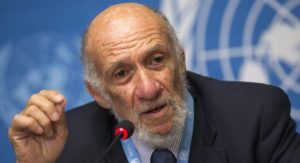Adrien Candiard ~ De islam begrijpen – Of beter gezegd, waarom we er niets van begrijpen
‘De Islam begrijpen’ is gebaseerd op Adrien Candiards lezing in de basiliek van Sint-Clothilde in Parijs op 19 november 2015. Hij hield zijn lezing vlak na de zes terroristische aanslagen van 13 november (o.a. in de Bataclan) waarbij 130 mensen omkwamen.
Het is ‘klaarblijkelijk onvoldoende aan islamitische autoriteiten te vragen dat ze via protestborden ‘not in my name’ afstand nemen van terroristen.’ Candiard constateert dat we dringend behoefte hebben aan de theologie, een theologie die een islam kan aanreiken die vrede heeft gesloten met zijn traditie, evenals met de vragen van deze tijd. Hierbij voldoet het niet een gematigde islam aan te bieden tegenover het extremisme. Candiard gelooft dat er ‘in de islamitische traditie een diepere en authentiekere radicaliteit bestaat die een spirituele radicaliteit kan worden, een zoektocht naar God in zichzelf, de ontmoeting met God, meer in het persoonlijke gebed dan in de zelfmoordaanslag. Dat zou waardering afdwingen, het zou een manier zijn de bloedende conflicten die de wereld verscheuren te verlaten.’ Het woord is aan de moslims zelf, ‘het is aan de profeten om erover te praten, en niet aan de leraren.’
Candiard stelt dat de tragische actualiteit en de verregaande veranderingen binnen onze samenleving vaak wijzen in de richting van de islam, waarbij we worden overspoeld met informatie en meningen. Maar hoe kunnen we het ‘ware gezicht’ van de islam achterhalen? Is het lezen van de koran genoeg? Verrijkt of belaagt deze godsdienst met een miljard gelovigen onze levenswijze en de wereldvrede? We kunnen de islam alleen begrijpen als we accepteren dat er grote interne verschillen bestaan. De islam is divers, je moet spreken over islam in meervoud, de essentie van dé islam bestaat niet.
Het geloof dat moslims alleen maar moslim zijn, dat hun religieuze identiteit al het andere zou bepalen, dat de islam een totale godsdienst is die alle aspecten van het leven omvat, is niet juist.
De islam kent een grote diversiteit, zowel in cultureel als theologisch opzicht. Een van de belangrijkste schisma’s is die tussen de soennieten en sjiieten.
De sjiieten zijn onderling verdeeld. Wat de ontelbare groepen bindt is het conflict met het soennisme. Ook het soennisme kent verschillende stromingen, zoals de wahabieten van Saoedi-Arabië en de machtige soefi-broederschappen van Senegal. Stromingen die onderling nauwelijks raakvlakken kennen. Read more
Over rijmdwang en monologue morbide
Bij een kunstobject, bijvoorbeeld een gedicht, heb je het al gauw over de vorm en de inhoud.
Als we de tekst van ‘het betere lied’ ook als poëzie beschouwen, en daar zijn argumenten voor, dan draagt Ivo de Wijs een mooi voorbeeld aan.
Toen haar man Eric Herfst in 1985 overleed, verwachtte Jasperina de Jong niet ooit nog verliefd te kunnen worden. Dat het toch gebeurde, is door Ivo warm verwoord in Veenbrand, voor haar theaterprogramma Tour de Chant uit 1989.
Het grootste belang van deze tekst is, dat hij recht doet aan de romantische kant van Ivo de Wijs. Wie hem vooral kent als de maker van geestige cabaretteksten, zal aangenaam verrast zijn te ontdekken dat hij ook een zeer poëtische kant heeft. Veenbrand is daar een mooi voorbeeld van, met een haast Brelliaanse beeldtaal.
Als een veenbrand, als een lang vergeten vuur
Kroop de oude liefde toch weer naar me toe
Kleeft er onverwacht weer volop avontuur
Aan de dingen die ik denk en die ik doe
Hoe bestaat ‘t, vraag ik opgewonden, hoe
Zou het komen dat het vuur zich weer liet zien
Na een tijd waarin ik moedeloos en moe
Niet meer rekenende op ‘ooit’ of op ‘misschien’
Ik weet waarlijk niet waar ik ‘t aan verdien
Maar de oude vlammen slaan weer door me heen
En jij blaast ze voor mij aan met windkracht tien
En ik ben niet meer, ik hoef niet meer alleen
Als een veenbrand die zich schuil houdt in het veen
En weer flakkert op het grilligste moment
Sloeg je toe, en wat ik voel van top tot teen
Is de warmte die ik vroeger heb gekend
Oude vlam, wat ben ik blij dat jij d’r bent
Je bent terug, je scheurt de knopen van m’n jas
En ik gloei weer en ik brand weer permanent
Als een meisje, als het meisje dat ik was
Het bestaan is zo veel meer dan schuim en as
En het houdt de beste pijlen op z’n boog
En na jarenlange wanhoop zorgt het pas
Voor het happy end, de clou, de epiloog
Het geluk onttrekt zich telkens aan het oog
Maar het smeult en wacht, en op de lange duur
Laait de liefde uit de diepten naar omhoog
Als een veenbrand, als een lang vergeten vuur
Gerben Bakker & Gert Jan Geling ~ Over politieke correctheid
Gerben Bakker en Gert Jan Geling onderzoeken in ‘Over politieke correctheid’ de historische ontwikkeling van politieke correctheid, haar morele grondslag (waarbij de ideeën van Hannah Arendt centraal staan), de rol die het speelt in onze tijd in discussies tussen de ’bestuurlijke kaste’ en de ‘verontwaardigde burger’ en wat de concrete gevolgen zijn van politieke correctheid. Ze constateren dat politieke correctheid niet onschuldig is, het bedreigt vrijheid van meningsuiting, het leidt tot (zelf)censuur en kan zelfs de veiligheid in gevaar brengen. Hoeveel politieke correctheid kan de maatschappij verdragen? Een pleidooi voor de legitimiteit van de westerse traditie en cultuur.
In de negentiger jaren stond ‘politieke correctheid gelijk’ aan de angst van bestuurders om minderheden te kwetsen, nu naar een doorgeslagen progressief moralisme en een uit Amerika overgewaaide ‘identity politics’. Nederland is verschoven van een progressieve, antiautoritaire cultuur naar een sfeer waarin we ‘benoemen’, in hokjes stoppen. Dat betekent een verschraling van het politieke denken, zoals Hannah Arendt dat beschrijft: het bespiegelen van het eigen denken aan andere perspectieven, een ‘enlarged mentality’, een veel perspectivische engagement en zo te komen tot een weloverwogen oordeel.
Ook internet heeft een grote impact op de samenleving, het belooft veel vrijheid, een groot ‘vrijgevochten politiek potentieel’, maar in de praktijk is er sprake van steeds meer gedragssturing. Mensen worden via algoritmes bevestigd in hun (politieke) keuzes. Internet is steeds meer in handen van kapitalistische ondernemingen in Silicon Valley, die de regie willen houden op de inhoud omdat ze niet aansprakelijk willen zijn voor incorrecte info,’hate incitement’ of het verspreiden van terroristische propaganda en dat heeft consequenties voor het bestaan van politieke correctheid, aldus Bakker en Geling. Later in het boek betogen de auteurs dat de absolute pluraliteit van politieke meningen op internet wél zijn gerealiseerd maar (nog) niet conform Arendts ‘enlarged mentality’. In plaats daarvan lijkt het politieke inlevingsvermogen dat benodigd is ontaard in een digitale oorlog van allen tegen allen, waarin alle feitelijkheid dreigt te sneuvelen. Read more
World Order In The Age Of Trump And Trumpism
Based on lecture given at West Chester University, October 24, 2018.
The title requires a few words of explanation. By the ‘Age of Trump,’ I mean not only the current American president. The phrase is meant to encompass elected leaders like him around the world. I have a friend in India who refers to Narendra Modi as ‘our Trump’ and the newspapers have been full of commentary to the effect that the new leader of Brazil, Jair Bolsonaro, amounts to ‘a Brazilian Donald Trump,’ although some familiar with Bolsonaro’s worldview insist that ‘a Brazilian Joseph Goebbels’ is more accurate. This extension of Trump to Trumpism is meant to make us aware that Trump is not just an American abnormality. He reflects a structural conditions that seem global in character, although with significant variations from nation to nation.[i]
By referring to ‘Trumpism’ my intention to highlight several issues beyond this autocratic brand of ‘democratic’ leader:
(1) To associate ‘Trumpism’ with a deliberate U.S. withdrawal from political and neoliberal globalization, without significantly challenging, perhaps even augmenting military globalism, enhancing capabilities to project destructive power anywhere on the planet, while weakening alliance commitments and multilateral trade frameworks;
(2) Trumpism also refers to the populist base of support for a global array of strong leaders, and their accompanying right-wing social, economic, and cultural policies, with the threat of ‘fascism’ and fascist tendencies being increasingly feared and perceived, even in centrist discourse;
(3) Trumpism also involves a shift of preferred worldview from globalist to nationalist centers of political gravity, with a loss of normative support for human rights, democracy, and multilateral diplomacy and cooperative forms of multilateral problem-solving and treaty making; and
(4) in the American setting, this phenomenon of Trumpism is not tied solely to the person of Trump; it could survive Trump if one or more of several scenarios unfold—for instance, in the 2018 and 2020 national elections the Republican Congress is reelected, even if Trump should be defeated or compelled to resign—in effect, the Republican Party has been effectively taken over by the ideas, values, and approach of Trump, and vice versa; it is difficult to disentangle ideological cause and effect as between party and leader.
The Kavanaugh confirmation hearings were one kind of straw in the wind, considering the iron party discipline manifested, and suggesting that the American judiciary will be Trumpist for many years even if Trump is defeated. Trump’s judicial appointments would set the judicial tone for years, if not decades, were the Democratic Party to take control of the Senate as early as November.
There is one important confusion surround the global approach of Trump, which arises from the perception of Trump as incoherent, impulsive, and dishonest, and nothing more than an opportunistic narcissist. I think this confusion can be exposed by distinguishing between Trump as tactician and Trump as strategist. It is as if it is necessary to approach the identity of Trump as an either/or question: either Trump is completely ad hoc and opportunistic or he knows what he is doing, and has been effective in carrying out his plan. My view is that Trump is both an erratic personality and a right-wing ideologue. Read more
The GOP Tax Cuts Are Already Hurting Social Security
The GOP has been intent on destroying Social Security since 1934 when its creation was first proposed by the Roosevelt administration. This, however, remained always a rather remote possibility … until now. With Trump and Congress transferring even more wealth to the rich and large corporations in the form of tax cuts that will land the country $10 trillion deeper in debt, the party of pseudo-fiscal hawks is campaigning hard for legislation that will lead to sharp cuts in Social Security and other entitlements.
In this context, the 2018 midterm elections could be the most consequential midterm election in years, according to Teresa Ghilarducci, an internationally known economist on labor and retirement. In this exclusive interview, Ghilarducci — a professor at The New School for Social Research, as well as the author of numerous books including Rescuing Retirement: A Plan to Guarantee Retirement Security for All Americans and When I’m Sixty-Four: The Plot Against Pensions and the Plan to Save Them — shares her analysis of the GOP attack on Social Security.
C.J. Polychroniou: Senate Republicans (and possibly a few Democrats) have their eyes set on slashing Social Security and other entitlements in order to balance the budget, although it is their own policies that have led to greater indebtedness. How serious is the possibility that they can succeed in undermining security retirement for millions of Americans?
Teresa Ghilarducci: During the 2012 presidential campaign, Republican politicians — including then-Texas Gov. Rick Perry and Sen. Ted Cruz — called Social Security a Ponzi scheme, which reveals a misunderstanding of Social Security finances and Mr. Ponzi’s 1920 investment fraud swindle — when Mr. Ponzi definitely spent more than he took in.
Further, in September of last year, newly appointed White House Economic Adviser Larry Kudlow commented that, “We have to be tougher on spending.” Strengthening that view, Senate Majority Leader Mitch McConnell — in what seemed to be a defense of the bad news surfacing in mid-October 2018 that the 2017 tax cuts will substantially deepen the federal deficit — claimed that the deficit ought to be blamed on the Democrats for their unwillingness to cut Medicare, Medicaid and Social Security.
The blame for the increase in the projected deficit falls on the tax cuts of 2017 that were a result of the Republican control of the federal government — almost all Republicans voted for the tax cuts and almost all Democrats did not. The cuts added $1 trillion to the federal deficit and the nonpartisan Joint Committee on Taxation did not support Republican arguments that the $1.5 trillion tax cut would pay for itself with economic growth. Senator McConnell’s announcement today makes clear political elites will use Social Security, Medicare and Medicaid as bargaining chips in budget negotiations and call for cuts in government spending.
I feel this accretion of Republican statements means that after the midterms, the higher federal deficits caused by the tax cuts of 2017 will fuel the chronic attack to cut the programs. Read more
The Brexit Nightmare: An Interview With Malcolm Sawyer
 It’s been more than two years since citizens in U.K. voted 48 to 52 for a split from European Union. Yet, the conservative government of Theresa May is still trying to come up with a workable Brexit plan, one that some may describe as allowing the U.K. to have the cake and eat it at the same time. Moreover, public opinion in U.K. remains sharply divided over Brexit, and this includes members of the Labour party itself, with some trade union leaders and Labour representatives even warming up to the idea of a second referendum.
It’s been more than two years since citizens in U.K. voted 48 to 52 for a split from European Union. Yet, the conservative government of Theresa May is still trying to come up with a workable Brexit plan, one that some may describe as allowing the U.K. to have the cake and eat it at the same time. Moreover, public opinion in U.K. remains sharply divided over Brexit, and this includes members of the Labour party itself, with some trade union leaders and Labour representatives even warming up to the idea of a second referendum.
Will Theresa May’s government be able to deliver an agreement before the U.K’s exit date, which is set for March 2019? Will Labour vote down May’s Brexit deal? And what will the British economy look like in the post-Brexit era? The renowned British economist Malcolm Sawyer, Emeritus Professor of Economics at Leeds University, sheds light on the Brexit conundrum in an exclusive interview below with C. J. Polychroniou.
C. J. Polychroniou: Professor Sawyer, let’s begin by asking you the most basic question, which is: what’s really holding up Brexit talks?
Malcolm Sawyer: There are the sheer complexities of unravelling the involvement of the UK in the European Union built up over 45 years, and the need for agreement over issues ranging from EU citizens rights in UK (and vice versa) after Brexit, the financial obligations of the UK on withdrawal, security co-operation, the nature of future trade relations etc.
There are the divisions within the government and the Conservative Party over the issues of the EU and leave or remain. There are basic differences between those who view Brexit in terms of ‘taking back control’ with little regard for economic costs involved and those who were Remainers seeking close trade ties and other co-operation with the EU after exit. It is then very difficult if not impossible to satisfy both and to arrive at any compromise.
Theresa May’s Brexit plans have been facing a lot of opposition from rebels in her own party all along, but now it seems that even the Northern Irish party that is propping up her government is making it difficult for the Prime Minister. Is it possible that U.K. could leave the bloc without any Brexit deal at all?
The process of UK leaving the EU involves two stages – the terms of the Withdrawal Agreement, sometimes seen as akin to a divorce settlement, which has to be settled within 24 months of the start of negotiations under Article 50 of the Treaty of Lisbon which means end of March 2019. The second stage will involve finalizing the future relationships between UK and the EU27 across a wide range of issues though the focus has been on the trade relations (e.g. a free trade area agreement, form of customs union), though it is intended that the broad outlines will be included in the withdrawal agreement. The intention has been for a 21 month transition or implementation period with further negotiations to establish the post-Brexit relationships.
A no-deal situation had been used to refer to no specific trade deal between UK and EU27, with trade between UK and EU27 operating under WTO arrangements with the tariffs charged by UK (EU27) on EU27 (UK) goods the same as charged by UK (EU27) on goods from countries with whom there was no specific trade agreements.
More recently no-deal has come to mean no withdrawal agreement between the EU and the UK, and hence the UK leaving at the end of March 2019 without any agreements over the nature of future relationships. Customs posts and checks would have to be quickly put into operation involving collection of new sets of tariffs and disruption to the just-in-time supply chains across countries, combining to lead to shortages in some key areas (agricultural products, pharmaceuticals often mentioned) and disruption of production.
It is clearly possible that UK to ‘crash out’ of the EU at the end of March 2019. A failure of the UK government to agree the withdrawal agreement with the EU, or a prospective agreement which is then rejected by the UK Parliament, would put the UK firmly on that path, and the chances of one of those coming to past looks to be significant. Read more







